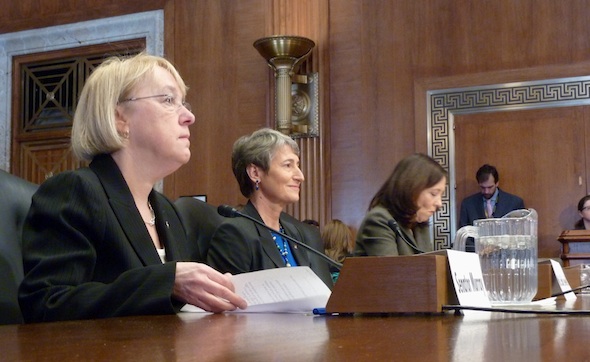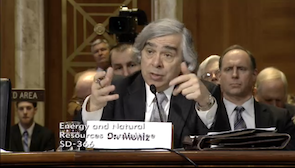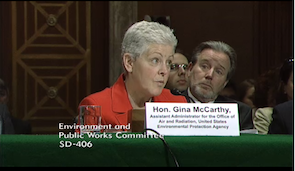Washington Water Main, April 15: Sally Jewell to Lead Interior Department; EPA and Energy Director Nominees Face Hearings
President Barack Obama’s nominees to lead the Environmental Protection Agency and Department of Energy are expected to join just-confirmed Interior Department Secretary Sally Jewell in developing the United States’ water, food, and energy systems.

Sally Jewell, currently the CEO of billion-dollar outdoor company Recreational Equipment Inc., will be the next Secretary of the Interior Department. She was sworn in Friday, after the Senate approved her nomination Wednesday with an 87-11 vote.
She takes over an agency that plays a significant role in managing the United States’ water, food, and energy resources, with regulatory influence over gas and oil development, wildlife and forest protection and management, national parks and grazing lands.
Jewell’s first major announcement as Interior Secretary will likely be a set of regulations for hydraulic fracturing on public lands—one of the most hotly debated energy and water-related topics on the Hill. Outgoing Interior Secretary Ken Salazar told a subpanel of the House Appropriations Committee Thursday, The Hill reported, that the draft regulations will surface in the “very near future.”
The rules will likely require companies to disclose chemicals they use in the fracking process, meet new well-construction standards, and more carefully manage wastewater returned to the surface after gas extraction.
Interior-managed lands account for 30 percent of natural gas output in the U.S., so these pending regulations have faced heavy lobbying, and were already revised once after an initial release in January. Despite heavy pressure during her Energy and Natural Resources Committee confirmation hearing from Republicans, including ranking member Lisa Murkowski (Alaska) and Tim Scott (South Carolina), McCarthy spoke only generally about a “balanced approach” to natural-gas development that considered economic and environmental costs and benefits.
Despite the aggressive lines of questioning, Jewell held broad-based appeal throughout her confirmation process thanks to her diverse background. She started her professional career as a petroleum engineer for Mobil Oil Corp. in Oklahoma and Denver, Colorado. She spent the next two decades as a commercial banker, initially working with energy- and natural resources-related companies before joining REI in 2000.
Follow Washington Water Main for coverage of the draft fracking regulations.
Two More Cabinet Members Near Confirmation
President Barack Obama’s nominees to lead the Environmental Protection Agency and Department of Energy had confirmation hearings in front of Senate committees last week.
While EPA Administrator nominee Gina McCarthy faced more concentrated opposition than Energy Secretary nominee Ernest Moniz, both are expected to earn Senate approval later this month.

The Senate Energy and Natural Resources Committee hosted Moniz’s hearing Tuesday. Moniz — currently the director of the Massachusetts Institute of Technology’s Energy Initiative, faced criticism from some anti-fracking groups over his longstanding financial ties to consulting and research groups that invest in hydraulic fracturing. Some also questioned how those relationships affected his academic integrity.
Moniz’s hearing, however, proved almost entirely cordial. He outlined a vision of an Energy Department that invests heavily in research and development for technology that transitions the U.S. to a low-carbon economy, and agreed to bolster nuclear innovation and waste-disposal security while avoiding excessive economic harm.
Retired U.S. Air Force Lieutenant General Brent Scowcroft captured the positive mood surrounding Moniz in his introduction.
“I simply cannot think of anyone more suited to be at the helm of the department,” Scowcroft said.
Moniz emphasized in his opening statement that his Energy Department would invest in everything from efficiency and renewables to nuclear and carbon capture and technology. Innovation in natural gas production would continue as well, he said, with a careful eye on environmental impacts. Each branch of the agency’s attention, he repeated, would focus on cost cutting and wide collaboration.
Solar energy, Moniz said, was a particularly exciting focal point, “making tremendous advances” as part of the U.S. energy supply, with costs dropping rapidly.
When challenged on controversial topics, Moniz deferred to Energy’s role as a research and development engine and convening force around innovation.
One such issue moving through the Department of Energy is approval for 15 natural gas export terminals to sell fuel to non-Free Trade Agreement countries.
Moniz would only say that many dynamics influenced the United States’ energy relationships with its allies. Exports, he added were one piece of the puzzle that he would consider as part of a broader review considering high-level energy security and national security interests.
When Gina McCarthy, currently EPA’s assistant administrator for air and radiation, testified for the Environment and Public Works Committee, two lines of questioning divided Senators.

One focused on transparency. Senator David Vitter (R-Louisiana), the committee’s ranking member, spoke out recently against the EPA’s record of transparency. He argues that the agency moves intentionally slowly on requests for information releases while refusing some release requests completely. He also said outgoing Administrator Lisa Jackson, and others, used person email addresses and instant messenger accounts to conduct agency business.
Committee chairwoman Barbara Boxer (D-California) disagreed with Vitter and his colleagues’ on the EPA’s lack of responsiveness, but did say in her opening statement that she hopes “all outstanding issues can be addressed promptly,” and that McCarthy could move forward toward confirmation.
During the question and answer period, McCarthy said she never inappropriately used her personal email account, and does not know how to use instant messenger.
The other, more fundamental series of disagreements centered on climate change, and the federal government’s role in mitigating its effects.
Several committee Republicans, led by Vitter, challenged McCarthy on multiple fronts where they saw economic harm resulting from rules McCarthy passed in the office of air and radiation or that other EPA divisions imposed.
Senator John Barrasso (R-Wyoming) pushed McCarthy to explain “thousands” of jobs, especially from coal-fired power plants, that he said EPA rules eliminated in states from Wyoming to Georgia. John Bozeman (R-Arkansas) said that, while he realizes the U.S. faces a roughly $US 500 billion shortage for water infrastructure upgrades, he thinks taxpayers should not foot the bill. Low-income taxpayers especially.
McCarthy’s diplomatic responses echoed President Barack Obama’s repeated calls for an “all-of-the-above” energy strategy, incorporating any and all available options from fossil fuels to renewables.
In each of her decisions during her 30-year regulatory career, McCarthy said, she has done her best to balance relevant laws, public-health concerns, and economic cost-benefit analyses.
Senator Bernie Sanders (D-Vermont) was most vocal in countering his Republican colleagues, pushing McCarthy to lead a more aggressive regulatory EPA. No Democrat asked McCarthy to scale back EPA’s regulatory scope.
Committee and Senate confirmation votes, while not yet scheduled, are expected for McCarthy and Moniz later this month.
Sources: The Hill
is a Washington, D.C–based correspondent for Circle of Blue. He graduated from DePauw University as a Media Fellow with a B.A. in Conflict Studies. He co-writes The Stream, a daily summary of global water news.






Leave a Reply
Want to join the discussion?Feel free to contribute!